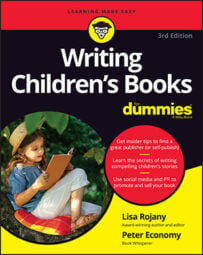After you’ve rewritten your children's book manuscript and edited it, you may need a professional editor or editorial service to check overall large elements of your story or to address final smaller (but no less important) issues to ensure you’re ready to submit your manuscript to an agent or publisher.
An editor is someone who corrects, finesses, and polishes a work at different levels of complexity to prepare it for publication. An editorial service can simply constitute one editor’s business, especially if she offers many different services (such as proofreading, line editing, and ghostwriting), or it can be a business composed of several editors with expertise in different areas.
Before you can choose someone to work with, you need to know exactly what kind of service you are seeking. Following are the different types of services you may be interested in:
Book doctoring: Rewriting, editing, and fixing a manuscript that has already been written. Usually done digitally.
Line editing: Going through a manuscript from start to finish and editing every line for every issue from grammar, spelling, and style to drama, pacing, characterization, and anything in between. Usually done on a hard copy of the manuscript or using a track changes tool for a digital document.
Copyediting: Type of editing that involves mostly fact and grammar checking; usually used for nonfiction books.
Read-through and evaluation: A general, overall reading of the work for its literary merits (or lack thereof) that points out the major flaws needing to be addressed without necessarily telling the writer how to go about executing them in detail.
Ghostwriting: When an editor or writer writes or thoroughly revises an original manuscript from start to finish and isn’t credited on the book, but does get paid and often shares in the royalties — or gets a nice flat fee.
Proofreading: Checking one printed version of a book against another printed proof of the book to make sure it doesn’t have misspellings, nothing is missing, images correspond to text, and all the edits were performed as indicated. Side by side, the two proofs should mirror one another after a proofread.
Literary consultations: Consultations between a seasoned writer and an editor can determine the literary merits of a work in progress. These can range from a read-through of the work and a citing of general impressions to more involved editing for character development to complete line editing.
Writing coach: Service offered by an editor who acts as editor, teacher, and mentor to the writer throughout the entire publishing process. A writing coach may work one on one with the author or may lead a writing workshop. Unlike a critique group in which every member participates equally, the workshop leader may do most of the critiquing.
Choose line editing if you aren’t sure what kind of editing you need. Line editing covers every type of editing your manuscript might possibly need to make it the best it can be — and it usually comes with a detailed critique letter to help you accomplish what the editor suggests.
When you are in the market for a professional editor, you need to do some homework before you hire someone.
This may be a labor of love for you first and then a business transaction, but no matter how much the editor ends up loving your work, editing is a business for her. And just like financiers do their due diligence on companies they want to buy or invest in, you need to do yours regarding your choice of editors.
Find a professional children’s book editor. Children’s books have different requirements than adult books. You want someone who has at least ten years under her belt as a children’s book editor at a reputable children’s book publishing house with published books containing Library of Congress numbers, books that have been sold in bricks-and-mortar bookstores, and can be located in a walk-in library.
Ask whether your editor published her own children’s book or two. If so, you can assume that she’s had experience on both sides of the line: editing and being edited. An editor who is also a published writer knows what it’s like having words critiqued and may carry this sensitivity into her work with you.
Find out what the editor’s clients and colleagues say about her. Look for quoted accolades or awards on her website or on the Internet. You want someone who is spoken of highly by at least a few industry professionals who can be reached by e-mail for verification.
Inquire about your editor’s education. Although university education shouldn’t make or break your decision (a few editors are self-taught or may have been mentored by the best in the business), knowing your editor has a passing familiarity with quality written material through the ages is a comforting feeling.
Find out how much the editor charges. Some charge a per-page rate of $2.50 to $5.00 or more, and some charge by the hour. Others charge a flat-rate minimum to start and then more money depending on how many pages there are in the manuscript. Some charge a per-project fee, specific to the length of the manuscript and the stage of writing or editing it is currently in.
Some editorial services list one editor’s credentials to bring in business and then send out the work to some other editor. Check to make sure you’re getting the services from the person whose credentials are listed and that your work isn’t being farmed out to a subcontracting editor without your knowledge. Or if it must be subcontracted out, make sure you have the right to approve the subcontractor.

